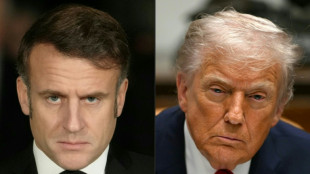-
 Gotterup charges to Sony Open victory in Hawaii
Gotterup charges to Sony Open victory in Hawaii
-
Gold, silver hit records and stocks fall as Trump fans trade fears

-
 Auger-Aliassime retires injured from Melbourne first round
Auger-Aliassime retires injured from Melbourne first round
-
Gauff through, Auger-Aliassime retires as Djokovic begins record quest

-
 China says economy grew 5% last year, among slowest in decades
China says economy grew 5% last year, among slowest in decades
-
Young star Zheng may have to give back Australian Open prize money

-
 Gauff overcomes wobble in winning start to Melbourne title bid
Gauff overcomes wobble in winning start to Melbourne title bid
-
Harry set for final courtroom battle against UK media

-
 'It wasn't clean': Mother mourns son killed in US Maduro assault
'It wasn't clean': Mother mourns son killed in US Maduro assault
-
Louvre heist probe: What we know

-
 Surging billionaire wealth a political threat, Oxfam warns as Davos opens
Surging billionaire wealth a political threat, Oxfam warns as Davos opens
-
Morocco fans stunned, disappointed as Senegal win Africa title

-
 Senegal fuelled by 'injustice' in AFCON final triumph, says hero Gueye
Senegal fuelled by 'injustice' in AFCON final triumph, says hero Gueye
-
Morocco coach Regragui laments 'shameful' scenes in AFCON final defeat

-
 Maye, Boutte wonder-catch carry Patriots past Texans
Maye, Boutte wonder-catch carry Patriots past Texans
-
Train collision in Spain kills 21, injures dozens

-
 Brazilians Abner, Endrick help Lyon climb to 4th in Ligue 1
Brazilians Abner, Endrick help Lyon climb to 4th in Ligue 1
-
Barca beaten at Real Sociedad as Liga title race tightens

-
 Socialist to face far-right candidate for Portugal's presidency
Socialist to face far-right candidate for Portugal's presidency
-
Senegal stun hosts Morocco to win AFCON title after final walk-off protest

-
 Syria's leader agrees truce with Kurds after govt troops advance
Syria's leader agrees truce with Kurds after govt troops advance
-
Morant shines as Grizzlies top Magic in London

-
 Real Sociedad end Barca winning streak to tighten Liga title race
Real Sociedad end Barca winning streak to tighten Liga title race
-
Senegal stun hosts Morocco to win AFCON title after ugly scenes mar final

-
 AC Milan in touch with Inter thanks to Fullkrug's first Serie A goal
AC Milan in touch with Inter thanks to Fullkrug's first Serie A goal
-
Lyon climb to fourth in Ligue 1 with victory over Brest

-
 Morant shines as Grizzles top Magic in London
Morant shines as Grizzles top Magic in London
-
Trump admin orders 1,500 troops to prepare for possible Minnesota deployment

-
 Limited internet briefly returns in Iran after protest blackout
Limited internet briefly returns in Iran after protest blackout
-
South Africa declares national disaster as floods batter region

-
 Gang members in Guatemala kill seven police after prison crackdown: minister
Gang members in Guatemala kill seven police after prison crackdown: minister
-
Villa's title bid rocked by Everton loss, Newcastle held at Wolves

-
 Dybala boosts Roma's Champions League hopes, Fiorentina honour Commisso
Dybala boosts Roma's Champions League hopes, Fiorentina honour Commisso
-
Villa's title bid rocked by Everton loss, Newcastle held by Wolves

-
 'Avatar: Fire and Ash' at number one in N.America for fifth straight week
'Avatar: Fire and Ash' at number one in N.America for fifth straight week
-
Limited internet returns in Iran after protest blackout

-
 Syria's leader agrees truce deal with Kurds after govt troops advance
Syria's leader agrees truce deal with Kurds after govt troops advance
-
Smith's penalty sees Quins eliminate La Rochelle, Bordeaux secure top seeding

-
 Atletico edge Alaves to strengthen Liga top-four hold
Atletico edge Alaves to strengthen Liga top-four hold
-
Uganda president says opposition 'terrorists' in victory speech

-
 New Zealand register first ODI series win in India despite Kohli ton
New Zealand register first ODI series win in India despite Kohli ton
-
Elvira wins Dubai Invitational after Lowry's last hole meltdown

-
 Jeong snatches Union late draw at Stuttgart in Bundesliga
Jeong snatches Union late draw at Stuttgart in Bundesliga
-
Man Utd's Martinez hits back at Scholes after height jibes

-
 Frank on the brink as Romero calls for unity amid Spurs 'disaster'
Frank on the brink as Romero calls for unity amid Spurs 'disaster'
-
Chile declares emergency as wildfires kill at least 15

-
 Europe hits back at Trump tariff threat over Greenland
Europe hits back at Trump tariff threat over Greenland
-
Men's Fashion Week in Paris: what to watch

-
 McGrath goes top of slalom standings with Wengen win
McGrath goes top of slalom standings with Wengen win
-
No Venus fairytale as Alcaraz, Sabalenka win Melbourne openers

Ishiba's Plan to Change Power in Asia
Is Japan Preparing for War? Ishiba's Vision to Redefine Power in Asia
In a world where geopolitical tensions are intensifying, Japan finds itself at a crossroads. At the centre of this discussion is Shigeru Ishiba, a prominent Japanese politician and former defence minister, whose bold proposals to reshape Japan's security policies are sparking widespread debate. Is Japan merely safeguarding its sovereignty, or is it actively preparing for conflict?
A Paradigm Shift in Japanese Defence
Since the end of World War II, Japan has adhered strictly to its pacifist constitution, particularly Article 9, which renounces the use of war as a means of settling international disputes. However, as global power dynamics evolve and regional threats grow, Ishiba and other leaders argue that Japan must modernise its approach to defence.
Ishiba has proposed a significant expansion of Japan’s military capabilities, including increased defence spending, the development of advanced technologies such as missile defence systems, and a shift towards a proactive deterrence strategy. These measures, he asserts, are necessary to counter the rising influence of China and North Korea's nuclear threat.
The Strategic Context: Asia in Flux
Japan’s strategic positioning in Asia has long been a delicate balancing act. With China's growing assertiveness in the South China Sea, Taiwan Strait, and East China Sea, Ishiba’s call for a stronger Japanese military aims to counterbalance Beijing’s influence. North Korea’s missile tests and unpredictable behaviour further exacerbate the urgency for a robust Japanese defence policy.
Ishiba’s proposals align with the broader trend of Indo-Pacific nations strengthening security alliances, including Japan's growing collaboration with the United States, Australia, and India under the Quadrilateral Security Dialogue (Quad). These partnerships are seen as essential to maintaining regional stability and ensuring a free and open Indo-Pacific.
Domestic and International Reactions
Domestically, Ishiba’s vision has faced both support and opposition. Proponents argue that his policies are pragmatic and essential for Japan’s survival in an increasingly volatile region. Critics, however, worry that such moves could escalate tensions and provoke adversaries. The debate also revives questions about the reinterpretation of Japan’s pacifist constitution and its implications for national identity.
On the international stage, Ishiba’s stance has drawn mixed reactions. Allies like the United States welcome Japan’s increased commitment to regional security, while China and North Korea view these developments as provocative and destabilising.
Preparing for Conflict or Preserving Peace?
Ishiba has repeatedly emphasised that his aim is not to prepare for war but to prevent it. He argues that a strong deterrent capability is the best way to avoid conflict and maintain peace in the region. However, critics contend that expanding Japan's military footprint could trigger an arms race and inadvertently increase the likelihood of confrontation.
The Road Ahead
As Japan navigates these turbulent waters, Ishiba’s vision represents a pivotal moment in the country’s post-war history. Whether his proposals will redefine Japan’s role in Asia or exacerbate regional tensions remains to be seen. What is certain, however, is that Japan’s future decisions will have profound implications not only for its own security but for the broader balance of power in Asia.
As the world watches, the question remains: Is Japan preparing for war, or is it merely adapting to a new era of uncertainty? In answering this question, the nation must grapple with the delicate balance between safeguarding its future and upholding the ideals that have defined its modern identity.

European democracy is weakening, report warns

Low demand: electric vehicles clog Belgian port

EU calls for tougher measures for a ‘tobacco-free generation’

This Summer experiences Romania first heatwave

Mike Pence: U.S. will continue to support Ukraine

Activists organise "flotilla" with aid for Gaza

Holy souls on display at 2024 Venice Biennale

Brussels, my Love? EU-Market "sexy" for voters?

The great Cause: Biden-Harris 2024

UN: Tackling gender inequality crucial to climate crisis

Scientists: "Mini organs" from human stem cells




